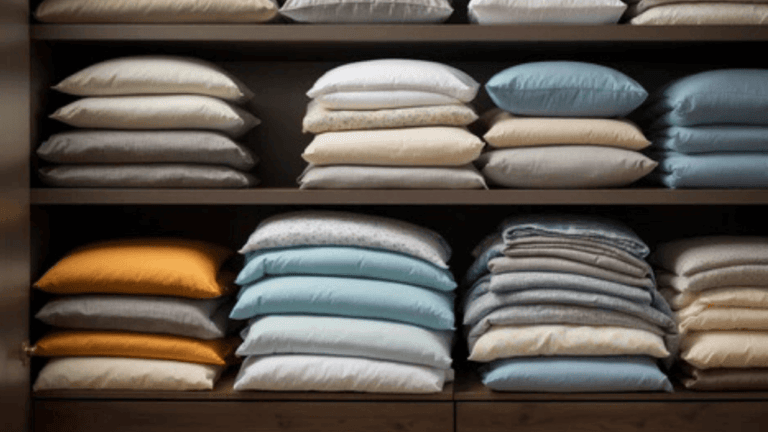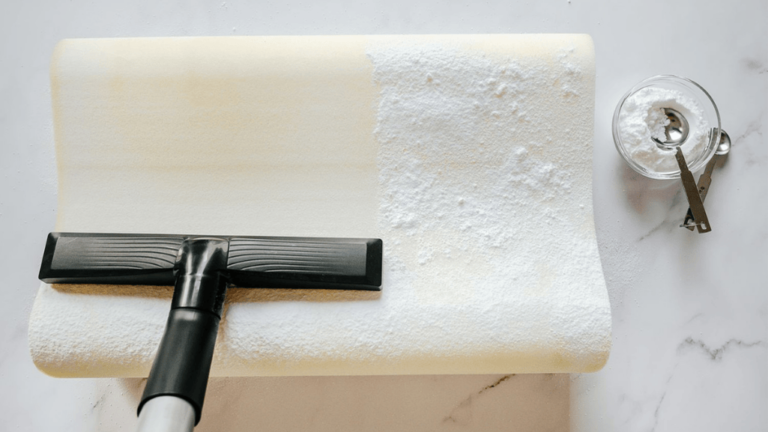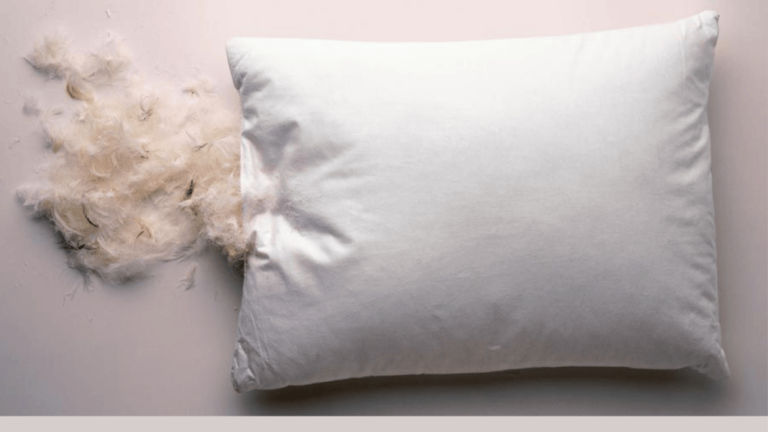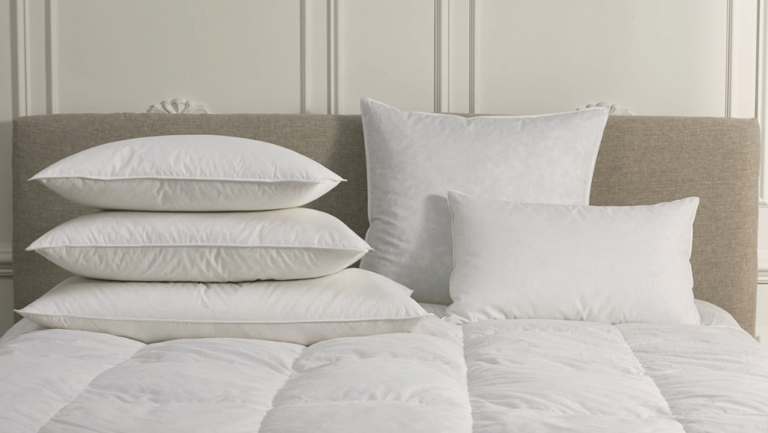Throw pillows add comfort and style to our living spaces. Yet, they collect dirt, pet hair, stains, and dust mites. To keep them looking good and fresh, we must clean them regularly with simple items we have at home.
Kathy Cohoon from Two Maids and Marla Mock from Molly Maid say reading and following the care labels is key. They recommend washing in warm water with gentle detergent. To tackle stains, pre-treat them. After washing, you can air dry or tumble dry on low with tennis balls.
Weekly, Kadi Dulude from Wizard of Homes advises freshening up with vinegar and a quick dryer cycle. This routine removes allergens and keeps the pillows smelling nice. But, even with the best care, old throw pillows might need replacing eventually.
Key Takeaways
- Deep clean throw pillows once a month to maintain freshness.
- Most throw pillows have removable covers that are machine washable.
- Use warm water and gentle detergent on a delicate cycle.
- Pre-treat stains with hot water and OxiClean for better results.
- Weekly freshening with vinegar and dryer cycles helps remove allergens.
Introduction to Washing Throw Pillow Covers
Cleaning throw pillow covers the right way can make them last longer and stay pretty. Start by looking at the care labels for how to clean them. This makes sure you clean each type of fabric correctly, from cotton to velvet and wool.
Getting stains out before washing is key. Use a stain remover with enzymes to tackle tough spots. This step helps the covers look like new again.
Using a washing machine is often the best method. Use cold water and mild detergent on a gentle setting. A mesh bag will keep delicate covers safe.
For drying, the pillow inserts can go in with dryer balls. Choose an air-only cycle to fluff and remove dust. Low heat is best for the covers to keep their shape.
It’s a good idea to clean throw pillows regularly, depending on how often you use them. For quick fixes, use dish soap and warm water or dry cleaning solvent.
Following these steps will keep your throw pillows looking great. Not only that, but it will help your home feel cozy and inviting.
How Often Should You Wash Throw Pillow Covers
How often you should wash throw pillow covers depends on how much they are used. It also relies on the room’s activity level. You should follow specific throw pillow cover washing instructions. This keeps them clean and looking good.
If pillows get used a lot, wash their covers often. This stops allergens from building up. It also keeps the covers looking new. For pillows in quieter areas, a monthly deep clean is okay. You can also clean spots if needed.
Each fabric type needs different care. Things like polyester, nylon, microfiber, and cotton can go in the wash. Yet, delicate fabrics like silk might need hand-washing or dry cleaning. Using the right throw pillow cover washing instructions helps them last longer.
Don’t stuff the washing machine too full. Colors may bleed from fabric rubbing together. Synthetics bleed less than natural fibers. Turning covers inside out can keep colors from fading.
After washing, some covers can go in the dryer. Others, like silk, need to air dry. Be sure to follow the throw pillow cover washing instructions. This is key to keeping your covers in good condition.
Why Regular Cleaning is Essential for Throw Pillow Covers
Cleaning throw pillow covers is key for health and looks. It gets rid of dirt, allergens, and stains. Doing this keeps your home healthy and your covers beautiful for longer.
When washing pillow covers, always check the tags for directions. Most fabrics can go in the washer, like polyester and silk. But, natural fibers like cotton might shrink.
Washing them inside out helps keep colors bright. It also reduces wear on the outside layer. This trick makes covers last longer and look better.
Don’t put too many covers in the washer. Too much can rub against each other, causing damage. A well-balanced load means better looking pillow covers.
Remember, some covers need to air dry. Others can handle the dryer. Knowing how to dry them right keeps your covers in great shape.
Following these cleaning tips keeps your home looking and feeling fresh. It’s a good way to care for your space.
Checking the Care Label for Washing Instructions
Washing your throw pillow covers right is key to keeping them nice. The throw pillow cover care guide tells you how to clean them best. It says if you should wash by hand, machine, or dry clean. It also gives tips on the right machine cycle, water temperature, drying, ironing, and the right detergent. Follow the label’s advice to avoid color fading, fabric damage, or harm to delicate materials like silk and wool.
Importance of Following the Care Label
Sticking to what the care label says is important. It helps keep your pillows looking good. Different fabrics need different cleaning methods. For example, you can machine wash fabrics like polyester, nylon, and cotton. Usually, you should use a gentle cycle. But, don’t machine wash delicate fabrics or foam pillows. By always checking the throw pillow cover washing instructions, you’ll know what to do. Clean removable cover pillows at least once a month. Wash the fillings every other month.
What If There Is No Care Label?
If your throw pillow doesn’t have a care label, be careful. Follow the cleaning methods you know are safe for that type of fabric. This might mean hand washing with a mild detergent and cold water. Remember, synthetic fabrics shouldn’t be washed in hot water. And natural fibers like cotton and wool might shrink if not washed gently. Following these basic tips is smart for keeping your pillows looking their best.
Pre-Treating Stains on Throw Pillow Covers
It’s key to know how to pre-treat stains on throw pillow covers. This helps keep them looking good longer. By knowing what stain types there are and using the best treatments, you can clean them well.
Identifying Common Stain Types
First off, we should spot the different stains that could get on our pillow covers. These might be oil-based from food or makeup, or water-based from drinks, or from spills. Knowing the type of stain lets us pick the right way to clean it.
Pre-Treatment Solutions
Using the right solutions is important for treating stains on pillow covers. For example, OxiClean works well to remove stains. Simply put a little on the stain and gently rub it in with a soft brush or cloth.
For hard-to-remove stains, you can soak the cover in a mix of hot water and OxiClean for 8-10 hours. Then, wash it as directed on the label. This could be in the machine on a gentle cycle or by hand. If washing by hand, make sure to soak it for about ten minutes first.
Doing this regularly keeps your pillow covers looking fresh and new. Following these cleaning steps will make sure your decor stays beautiful for a long time.
How to Wash Throw Pillow Covers
To start washing throw pillow covers properly, first remove them from the pillows. Look for any stains and treat them before washing. Then, consider if you should wash them by hand or in a machine.
If you’re using a washing machine, pick a gentle cycle. Use a mild detergent. Most fabrics like polyester, nylon, and cotton should be fine in a machine. But, with natural fibers like cotton, use care as they might shrink. Always check for the fabric’s drying recommendations, air drying or a low dryer setting may be best.
Hand washing involves cold water and a mild detergent. This method works well for delicate fabrics. Some items must be air dried, others can use a clothes dryer with no heat.
| Washing Method | Suitable Fabrics | Drying Method |
|---|---|---|
| Machine Washing | Polyester, Nylon, Microfiber, Cotton, Linen, Silk | Air Dry, Low Heat Dryer |
| Hand Washing | Delicate Fabrics, Natural Fibers | Air Dry |
In caring for decorative and accent pillows, it’s wise to spot clean them regularly. This keeps them looking good and lasting longer.
Hand Washing vs. Machine Washing: Which is Better?
Choosing how to clean throw pillow covers can really affect how long they last and how they look. The best choice between hand washing and machine washing depends on what the cover is made of and the care it needs.
When to Choose Hand Washing
If your pillow covers are delicate, like silk or have fancy designs, hand washing is best. Use gentle soap with lukewarm water to keep them safe. This way is also for covers not meant for the machine, such as those made of latex or memory foam.
Washing them by hand regularly, as the care guide suggests, keeps them looking nice and clean.
When Machine Washing is Suitable
Covers made of stronger fabrics, like cotton and polyester, do well in a machine. Always check the care tag first to be sure. If it’s okay, a gentle wash with soft detergent is best.
To protect your covers, wash two at a time. This keeps your washing machine from getting too rough with them. Washing covers like this each month helps them stay fresh and free of things like dust mites.
| Hand Washing | Machine Washing |
|---|---|
| Best for delicate fabrics and embellishments. | Ideal for sturdier materials like cotton and polyester. |
| Uses gentle detergent and lukewarm water. | Requires a gentle cycle and mild detergent. |
| Suitable for non-machine washable pillows. | Convenient for large loads and routine cleaning. |
| Aligns with throw pillow cover care guide for delicate items. | Effective in removing dust mites and allergens. |
Drying Throw Pillow Covers Properly
Properly drying pillow covers is key for their upkeep. It keeps their shape and feel. Using an air dry or low heat in the dryer is best. It keeps the fabrics safe. Marla Mock recommends adding tennis balls. They boost fluffiness. Kathy Cohoon says to get out extra water first. This stops mold and mildew. It’s crucial for good care of your pillow covers.
Each fabric needs a different drying approach. Silk and wool often need dry-cleaning. Yet, cotton, linen, and polyester are usually fine to machine-wash and air-dry. For a dryer, try a ‘no heat’ setting. Also, hand fluffing pillows at points helps keep their shape.
Here are some extra tips for drying throw pillow covers right:
- A well-ventilated spot for air drying ensures they dry well all over.
- When machine washing, use a front-loader with warm, delicate settings. Then, hang them to dry most of the way.
- Use dryer balls to help pillows keep their shape while drying on a ‘no heat’ setting.
Doing the right care for throw pillow covers keeps them looking new. It makes sure they stay as an appealing, clean part of your home longer.
Tips for Maintaining Throw Pillow Covers
It’s important to take care of your throw pillow cover. Cleaning them often not only makes them look better but also helps them last longer.
Regular Care Practices
Start with a cleaning routine for your throw pillow covers. Shake them and vacuum them to get rid of dust. If you spot a stain, clean it right away.
A mix of hot water and OxiClean is great for stains. Let them soak for 8 to 10 hours. You can also freshen up the covers by using vinegar and dryer cycles.
Storage Tips
Storing your throw pillow covers correctly is crucial. Always make sure they are clean before putting them away. Keep them in a dry place to prevent mold.
Use breathable storage bags to help your covers stay in good shape. And don’t forget to read the care instructions from the manufacturer.
By following these steps, your throw pillow covers will stay beautiful. This will make your home look even better.
Common Mistakes to Avoid When Washing Throw Pillow Covers
Washing throw pillow covers correctly is key to keeping them nice for longer. But, some common mistakes might mess up your plans. Knowing these errors can guide you in the right path to cleaning them well.
Using Harsh Detergents
One wrong move is picking harsh detergents. They harm the fabric of throw pillow covers. It’s smarter to use gentle, mild detergents for those softer materials. Harsh chemicals can make the covers shrink, change color, or damage the fabric.
Ignoring the Care Label
The care label gives you the most important cleaning info for the fabric’s type. Skip this label’s advice and you could ruin your covers. If it says dry-clean-only, don’t toss it in the washer. But for machine-washable ones, following the care labels is a must for their longevity.
Overloading the Washing Machine
Putting too much in your washing machine is a recipe for trouble. It stops things from getting truly clean and can harm your covers. A well-balanced load makes sure the water and detergent can move around well. Plus, it helps keep both your pillows and washer in good shape.
Here are some tips for looking after your throw pillows:
- Check care labels before washing.
- Use mild detergents to avoid fabric damage.
- Avoid overloading your washing machine.
Steering clear of these slip-ups will show you the right path to cleaning throw pillow covers well. And that means they’ll stay pretty and useful for a long time.
Conclusion
Keeping your throw pillow covers clean is important for their longevity. By following the right cleaning methods, you can prevent them from getting dirty or full of allergens. This keeps them looking new.
It’s crucial to wash your pillow covers in the right way to avoid damage. Use gentle products and don’t overload the washing machine. Remember, different materials need different care to keep their colors and quality.
This guide helps you take better care of your pillows, improving your home’s look and feel. Pay attention to your pillow’s needs and upkeep. This way, you enjoy their comfort and design for a long time.














